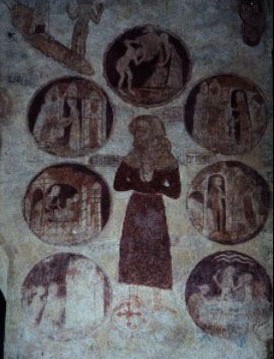| Week 4 |
LECTURE
POPULAR DEVOTION |
Changing relationship of the Church (as hierarchical institution
rather than as community of all believers) to laity --
early > high Middle Ages perception of God in Old Testament
terms, ie stern judge / cannot countenance sin -- only a few very devout
believers likely to be saved (eg monks)
growth of doctrine of Purgatory
--
middle place between Heaven and Hell
so more can be saved eventually, but need to have souls purged in Purgatory
> prayers (laity)
and masses (clergy)
Gregory VII Reform > celebacy of
clergy / clergy as separate order > reappraisal of role of laity --
marriage -- seen as sacrament (confirmed 1215, canons 50 - 52)
greater emphasis on humanity of
Christ > interest in Holy
Family / importance of charity
Fourth
Lateran Council (1215) -- no new religious order (canon 13), reaffirms
celebacy of clergy etc.
doctrine of transubstantiation
-- bread > body: wine > blood (canon 1)
Canon 21:
'All the faithful of both sexes shall after they have reached the age of
discretion faithfully confess all their sins at least once a year to their
own priest and perform to the best of their ability the penance imposed,
receiving reverently at least at Easter the sacrament of the Eucharist'
need for laity to be instructed
in the faith so as to right and wrong (sin) and so make confession
pastoral manuals
sermons / homilies
religious art -- glass,
wall paintings
etc.
drama (eg Plays of the Lord's Prayer and of the Creed)
didactic programme: 10 Commandments,
7 Sacraments, 7 Works, 7 Deadlies [see below]
evidence for growing involvement
of laity in faith / devotion at parish level --
cult of saints
-- eg Christopher (sudden death), Margaret (childbirth) -- Fourteen
Holy Helpers
shifting emphasis from local saints > Marian / Christocentric cults
includes new models of devotion (eg St Anne -- well-off, married woman;
St
Sitha [Zita] --
servant)
role of saints in creating identities -- eg gender, regional, national
(eg George, Denys)
pilgrimage
-- eg St James (Santiago de Compostella), St Thomas (Canterbury), Holy
Blood (Wilsnack)
religious guilds or confraternities
-- welfare club / burial society, but also promotion of cult (including
drama)
patronage of parish churches --
growing sense of ownership
Eucharistic devotion
-- follows directly from clerical teaching -- mass as symbolic re-enactment
of crucifixion -- bread and wine as body and blood -- crucifix / Last
Judgement in parish church
encouraged laity to think about crucifixion / Christ's sufferings / judgement
at mass
new feast of Corpus Christi -- processions, Plays > anti-semitism
The Mixed Life (contemplation +
good works etc. in the world) / interest in following Christ --
patronage of almshouses; devotional reading; Devotio
Moderna etc.
concern for dying well / being
remembered -- reduces time in Purgatory
endowment of masses / chantries
(but also schools, colleges, almshouses with chantry functions)
late medieval legacy
increase in number of literate,
informed (and hence critical) laity
shifting relationship of laity
to ordinary clergy -- guild priests, chantry priests etc. as employees
lay enthusiasm not always satisfied
> heretical movements -- Hus > Hussites; Wycliffe > Lollary
burden of anxiety re salvation
NB appeal of Luther (justification
[salvation] by faith alone,
ie not good works) was to devout catholics, not those alienated from Catholicism
Lord's Prayer
(Paternoster)
Our Father, who art in heaven, hallowed
be Thy name. Thy kingdom come. Thy will be done on earth as it is in heaven.
Give us this day our daily bread and forgive us our trespasses as we forgive
those who trespass against us. And lead us not into temptation, but deliver
us from evil. Amen.
Ave
Hail Mary, full of grace, the Lord
is with thee. Blessed art thou amongst women and blessed is the fruit of
thy womb, Jesus. Holy Mary, Mother of God, pray for us sinners, now, and
in the hour of our death. Amen.
Creed
I believe, in God, the Father almighty,
creator of heaven and earth. I believe in Jesus Christ, His only Son, our
Lord. He was conceived by the power of the Holy Spirit and born of the
Virgin Mary. He suffered under Pontius Pilate, was crucified, died, and
was buried. He descended to the dead. On the third day He rose again. He
ascended into heaven and is seated at the right hand of the Father. He
will come again to judge the living and the dead. I believe in the Holy
Spirit, the holy catholic Church, the communion of saints, the forgiveness
of sins, the resurrection of the body, and the life everlasting. Amen.
NB many
layfolk would have been taught to recite the above (Paternoster, Ave and
Creed) in Latin.
Ten Commandments
1. I am the Lord thy God; thou shalt have no strange
gods before Me.
2. Thou shalt not take the name of the Lord thy
God in vain.
3. Remember thou keep holy the Lord's day.
4. Honor thy father and thy mother.
5. Thou shalt not kill.
6. Thou shalt not commit adultery.
7. Thou shalt not steal.
8. Thou shalt not bear false witness against thy
neighbour.
9. Thou shalt not covet thy neighbour's wife.
10. Thou shalt not covet thy neighbour's goods.
The Seven Sacraments
Baptism, Confirmation, Penance, the Mass, Holy Orders,
Matrimony, Last Rites
The Seven Corporal Works of Mercy
(based on Matthew 25 to which burying the dead is added
from the Book of Tobit)
The Seven Deadly Sins
1. Pride - unrestrained appreciation of our own worth
2. Avarice or Greed - immoderate desire for earthly goods
3. Envy - sorrow over another's good fortune
4. Anger - inordinate desire of revenge
5. Lust - hankering for impure pleasures
6. Gluttony - unrestrained use of food and drink
7. Sloth - laxity in keeping the Faith and the practice
of virtue, due to the effort involved
return
to Main Page
go
to discussion group
